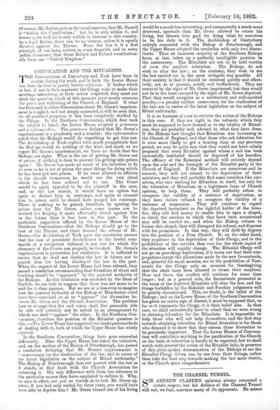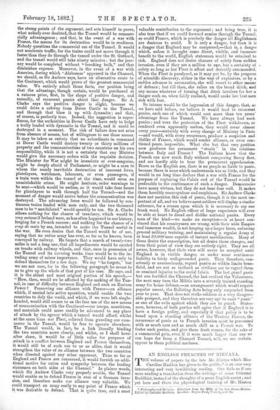THE CHANNEL TUNNEL.
SIR ANDREW CLARKE'S opinions always command a certain respect, but his defence of the Channel Tunnel will not, we fear, convince many of its opponents. He misses the strong points of the argument, and sets himself to prove, what nobody ever doubted, that the Tunnel would be commer- cially advantageous ; and that, in the event of a war with France, the means for its destruction would be in readiness. Nobody questions the commercial use of the Tunnel. It would not accelerate traffic, for the trains could not move through it faster than they do through the tunnel under the St. Gothard, and the transit would still take ninety minutes : but the jour- ney would be completed -without "breaking bulk," and that diminishes expense. Moreover, in the event of a war with America, during which Alabamas ' appeared in the Channel, we should, as Sir Andrew says, have an alternative route to the Continent, which would prove of the greatest commercial value. We entirely admit those facts, our position being that the advantage though certain, would be purchased at a ruinous price, first, in the shape of positive danger, and secondly, of recurrent panics about that danger. Sir A. Clarke says the positive danger is slight, because we could drive a subway from Dover Castle to the Tunnel, and through that blow it up with dynamite ; and that, of course, is perfectly true. Indeed, the suggestion is super- fluous, for the authorities in Dover Castle have only to lodge a trolly loaded with dynamite in the Tunnel, and it could be destroyed in a moment. The risk of failure does not arise from absence of means, but of willingness to use those means. It may be taken as certain that no subordinate in command at Dover Castle would destroy twenty or thirty millions of property and the communications of two countries on his own responsibility, while it is not a certainty that any Minister would give the necessary orders with the requisite decision. The Minister for War might be irresolute or over-sanguine, might be deeply afraid of Parliament, or might be a man to whom the nearly inevitable destruction of innocent lives, platelayers, watchmen, labourers, or even passengers, if a train were within the tunnel at the time, would seem an unmistakable crime. He might hesitate, order warnings to be sent—which would be useless, as it would take four hours for platelayers to walk through half the Tunnel—and the moment of danger would arrive before the communication was destroyed. The advancing force would be followed by con- tinuous trains loaded with men only, and the two thousand men to be " annihilated " would speedily be ten. Sir A. Clarke allows nothing for the chance of treachery, which would be very serious if Ireland were, as has often happened in our history, longing for a French success ; and nothing for the chance of a coup de main by sea, intended to make the Tunnel useful in the war. He even denies that the Tunnel would be of use, saying that no entire army has ever, so far as he knows, been conveyed by railway. He forgets that a march of twenty-two miles is not a long one, that all impedimenta would be carried on trucks with railway wheels, and that, once in possession of the Tunnel and its covering works, time would be to the in- vading army of minor importance. They would have only to defend themselves for a few days. We say "he forgets," but we are not sure, for in the following paragraph he seems to us to give up the whole of that part of his case. He says, and it is the ablest and most original portion of his speech,— "How, then, would we be affected by the making of the Tun- nel, in case of difficulty between England and such an Eastern Power ? Preserving our alliance with France—an alliance which, if carried into active operation, would enable the two countries to defy the world, and which, if we were left single- handed, would still secure to us the free use of the new means of communication with the Continent—our troops, munitions, and materials could more readily be advanced to any place of attack by the agency which a tunnel would afford, whilst at the same time our Fleet, relieved from guarding our com- merce in the Tunnel, would be free to operate elsewhere. The Tunnel would, in fact, be a link literally binding the two countries more closely, and whilst, as I shall here- after show, it would be of little value for purposes of .attack in a conflict between England and France themselves, it would still be of such use to us as allies, that it would strengthen the value of an alliance between the two countries when directed against any other opponent. Thus so far as England and France are concerned, it would furnish an addi- tional motive for union and sympathy between the leading statesmen on both sides of the Channel." In plainer words, which Sir Andrew Clarke very properly avoids, the Tunnel would enable us to defend France in case of a German inva- sion, and therefore make our alliance very valuable. We could transport an army easily to any point of France which it was desirable to defend. That is quite true, and a most valuable contribution to the argument ; and being true, it is also true that if we could forward armies through the Tunnel, so could France, which is precisely the danger all Englishmen are desirous to avoid. It is only a danger, but then it is a danger that England may be conquered,—that is, a danger which, unless it brought some direct, visible, and immense benefit to the world, English statesmen would be criminal to risk. England does not desire chances of safety from sudden invasion, even if they are a million to one, but a certainty of safety so long as her Fleet is afloat and decently commanded. When the Fleet is paralysed, as it may yet be, by the progress of scientific discovery, either in the way of explosives, or by a sudden advance in aeronautics, she will resort to other means of defence ; but till then, she relies on the broad ditch, and any means whatever of turning that ditch involves for her a danger such as, when fairly realised, would make her best men sick with fear.
So intense would be the impression of this danger, that, as we have said before, we believe it would lead to recurrent panics, each one of which would cost more than ten years' advantage from the Tunnel. We have always had such panics ; and were the protection of the Fleet withdrawn, or rendered even apparently useless, they would recur almost every year—certainly with every change of Ministry in Paris —and would, with every recurrence, produce a suspicion and dislike of France, which would render alliance, or even con- tinued peace, impossible. What else but that very position now produces the permanent " strain " in the relations between Italy and France ? The Italians know that the French can now reach Italy without conquering Savoy first, and are hardly able to bear the permanent apprehension. Brave as the English are, there is no people so liable to panic, because there is none which understands war so little, and they would in no long time declare that a war with France for the purpose of capturing the Calais end of the Tunnel would be preferable to the continuance of such a danger. Democracies have many virtues, but they do not bear fear well. It makes them horribly unscrupulous and suspicious. Sir Andrew Clarke does not mention this risk of panic, though it is the most im- portant of all, and we believe most soldiers will display a similar reticence, for a reason upon which it is necessary to say one frank word. No English officer of large experience will ever be able at heart to dread and dislike national panics. Every man of the kind—we make no exception—is at heart con- vinced that his countrymen are wrong, with their wide Empire and immense wealth, in not keeping up a larger force, enforcing general military training, and maintaining a regular Army of at least 50,000 men capable of instant mobilisation. Many of them desire the conscription, but all desire these changes, and from their point of view they are entirely right. They are all aware, however, that their view will never be accepted until England is in visible danger, or under some continuous liability to fairly well-grounded panic. They therefore, con- sciously or unconsciously, regard panics as within limits bene-
ficial, and are not as inclined as civilians are to regard them as unmixed injuries to the social fabric. The last grand panic but one fortified the Channel, the last evolved the Volunteers, the next may turn the Militia into a severely trained standing army for home defence,—an arrangement which would require popular assent, the Balloting Acts being only suspended from year to year. That does not strike soldiers as a very disagree- able prospect, and they therefore are very apt to omit "panic" as one of the evils against which they are to guard. States- men, however, of both parties will agree that if England is to have a foreign policy, and especially if that policy is to be based upon a standing alliance of the Western Powers, the recurrence of panic as to French invasion must be prevented
with as much care and as much skill as a French war. To foster such panics, and give them fresh reason, for the sake of
a commercial gain, even if it were much larger than any we can hope for from a Channel Tunnel, will, we are certain. appear to them political madness.



































 Previous page
Previous page